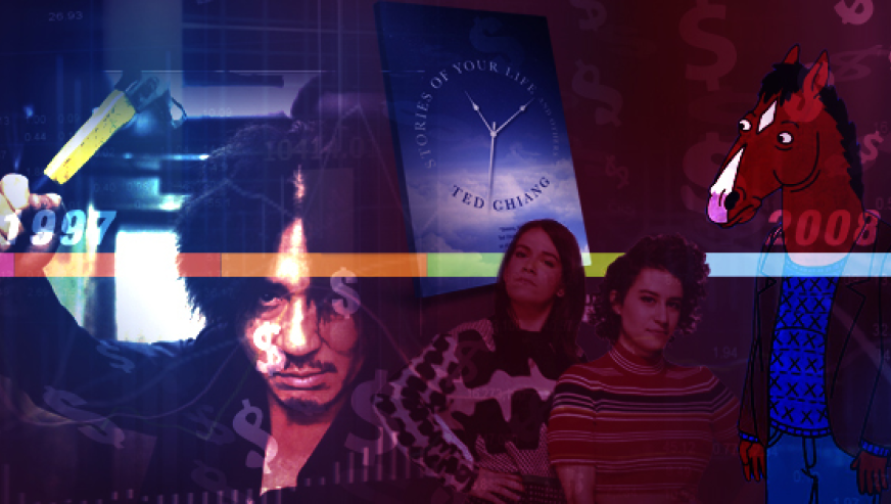
By Annabel Adams
Scholars in the School of Humanities at the University of California, Irvine have found a shared focus in creative works, from critically-acclaimed films like Park Chan-wook’s “Oldboy” to animated TV shows like “BoJack Horseman”: economic pressures.
Instead of sharing tips on personal finance this Financial Literacy Month, English scholars at UCI share their research on creative works that they believe help us look critically at the economic forces that have shaped, and continue to shape, our lives.
Chris Fan, assistant professor, Department of English
Chris Fan's work explores how Asia's economic and geopolitical rise over the last few decades has changed what it means to be Asian, American, and Asian American. His current book project, Principles of Selection: Asian American Fiction after 1965, reads contemporary Asian American fiction against the backdrop of economic migration from Asia since the passage of the 1965 Immigration and Nationality Act. The Act was a watershed policy moment that transformed Asian Americans from a small minority of mainly agricultural and industrial laborers into the fastest growing ethnic group in the U.S. This population increasingly consisted of skilled and highly trained professionals, especially in STEM fields. Economic crises at home, as well as political instability, were often the "push" factors motivating these skilled migrants to move to the U.S. for work and education.
Fan argues that because many contemporary Asian American writers are the children of these economic migrants and were themselves trained in STEM fields, their fiction has been unusually sensitive to developments in the global and domestic U.S. economy (like deindustrialization, the glitz of Silicon Valley, and the financialization of daily life). Post-1965 Asian American fiction as a whole—which includes writers like Chang-rae Lee, Maxine Hong Kingston, Karen Tei Yamashita, Ted Chiang, Alice Sola Kim, Charles Yu, Ling Ma, Eugene Lim, and Claire Light—can thus be read as an exploration of the deep connections between economic identity and racial identity, and as an account of the struggle to find personal and communal meaning in the global economy as a whole.
Joseph Jeon, professor, Department of English
How do filmmakers represent economic crisis in their films and how does the economy itself affect filmmaking? These questions are at the heart of Vicious Circuits: Korea's IMF Cinema and the End of the American Century (Stanford University Press, 2019) by Joseph Jonghyun Jeon.
In Vicious Circuits, Jeon examines what he coins "Korea's IMF Cinema"—the decade of cinema following South Korea’s economic collapse of 1997 when the International Monetary Fund announced the largest bailout package in its history, aimed at stabilizing the South Korean economy. From internationally renowned films like Park Chan-wook’s “Oldboy” to more obscure art films, the proliferation of movies produced during this timeframe share in common their focus, whether explicit or implicit, on economic themes.
“I had known about directors like Park Chan-wook, Lee Chang-dong, and Bong Joon-ho because of their international reputations, but I was delighted to discover while I was doing research so many wonderful little films that run the gamut from comedy to art house to action—like ‘Oollala Sisters’ (2002), ‘Foul King’ (2000), ‘Looking for Bruce Lee’ (2002), ‘Helpless’ (2012), and many more,” says Jeon.
Annie McClanahan, associate professor, Department of English
Annie McClanahan is on a mission to change the way we think and talk about our everyday economic lives. Her award-winning book Dead Pledges: Debt, Crisis, and 21st Century Culture (Stanford University Press, 2016) explored the relationship between consumer debt—credit cards, mortgages, and student loans—and U.S. culture after the financial crisis of 2008. Her new work explores what she calls the “tipworkification of labor”: the fact that more and more of today’s jobs, from waiting tables to driving for Uber, don’t pay steady wages but rather force workers to rely on tips.
McClanahan thus encourages us to start paying attention to how often these kinds of jobs show up in contemporary popular culture, especially on TV.
"On recent sitcoms like ‘Atlanta,’ ‘Broad City,’ ‘Crashing,’ ‘Easy,’ ‘Girls,’ ‘BoJack Horseman,’ ‘High Maintenance,’ ‘Insecure,’ ‘It's Always Sunny in Philadelphia,’ ‘Master of None,’ ‘Silicon Valley,’ ‘Unbreakable Kimmy Schmidt,’ ‘Togetherness,’ ‘Two Broke Girls,’ and ‘Search Party,’” she points out, "we find characters driving for Uber, serving drinks, working for TaskRabbit or Mechanical Turk, making espressos, renting their bedrooms on Airbnb, delivering consumer goods, and waitressing. Tipwork even shows up on reality TV, with shows like ‘Vanderpump Rules,’ ‘Below Deck,’ and ‘Timber Creek Lodge.’ While sitcoms have long been interested in the workplace, these new shows break from the tradition of representing the workplace as a substitute family—as in older shows like ‘The Office’ or ‘Cheers’—and instead take up the more fragmented, episodic, and precarious experience of working without a guaranteed wage."
Michael Szalay, chair and professor, Department of English
Michael Szalay studies how the economic restructurings of the last twenty or so years have changed fundamentally what we read and watch for pleasure. Sometimes that means pointing out just how obsessed novels and TV programs have become with global finance. But Szalay also studies, for example, how the widespread use of futures contracts and financial derivatives—originally used to stabilize exchange rates in global trade—have led indirectly to new uses of time and narrative continuity in novels like David Foster Wallace's The Pale King and HBO dramas like “The Newsroom” and “Game of Thrones."
Szalay directs the UCI Center for Culture and Capital and is the author of two books that explore the intersections between culture and capital: Hip Figures: A Literary History of the Democratic Party and New Deal Modernism: American Literature and the Invention of the Welfare State. He is currently finishing a book that traces what many critics have called our new Golden Age of TV to the dislocating effects of deindustrialization and, much more specifically, to two landmark pieces of legislation passed in 1996: The Telecommunications Act and the Personal Responsibility and Work Opportunity Act.
